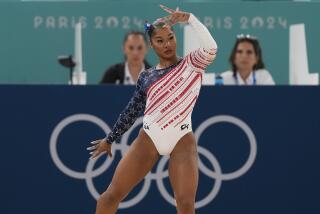Hamm Takes Issue With Medal Dispute
- Share via
ATHENS — U.S. gymnast Paul Hamm, the gold-medal winner in the men’s all-around event, said he is upset with international gymnastics officials over a judging dispute that may lead to the awarding of a a duplicate gold medal.
“This matter should never have come up,” Hamm said Sunday, after finishing fifth in the floor exercise and sixth in the pommel horse in individual competition. “Rules can’t be changed after the competition is over. Right now, I personally feel I shouldn’t even be dealing with this.”
Hamm’s remarks came as U.S., Korean and international gymnastics and Olympic officials wrestled to find a suitable response to an International Gymnastics Federation finding that a scoring error gave Hamm the gold in the all-around over Yang Tae Young of South Korea.
Scoring controversies are nothing new to the Olympics, or to sports, where the judging is subjective. The difference with this case is that it stems from what appears to have been an unintentional mistake that was made before the competition.
Asked Sunday about the possibility of Yang being awarded a duplicate gold medal, Hamm’s coach, Miles Avery, said, “I would think Paul was cheated.”
Korean officials declined to comment. On Saturday, Korean delegation official Yoo Jae Soon said, “We want this obvious mistake to be corrected. It’s simple.”
Hamm, who had been in 12th place with two routines remaining, came back to win by .012, the closest margin for the event in Olympic history. South Korean Kim Dae Eun took silver, Yang the bronze.
Yang received a “start value” of 9.9 on parallel bars. The term refers to the difficulty of a routine; judges subtract points from the start value to figure a score. But after reviewing a tape of the all-around, officials from the gymnastics federation, which goes by the acronym FIG, said he should have received a start value of 10.0, the same value he had received for the routine in the team qualifying and finals.
That extra .10 would have given Yang 57.874 points. He would have defeated Hamm by .051; Kim would have been third.
Hamm said FIG was wrong to review a tape of the competition. “I’m upset FIG did that and not until a day after the all-around competition. If you start reviewing tapes of gymnastics, do you review every one? Who’s to say there weren’t other mistakes? I think FIG should abide by its own rules.”
Hamm’s twin brother, Morgan, also a member of the U.S. gymnastics team, said Sunday, “I don’t think Paul’s gold medal should be tarnished. What he did on the last two rotations was awesome. I don’t think you can predict how the competition would have ended if Yang’s score was changed. How do you know how Yang would have done with the pressure of a lead?”
Gymnastics protocol allows for an inquiry, which must be filed within one event after the one in question. The men’s all-around took place Wednesday. The Korean delegation filed its inquiry Thursday. Thus, FIG officials said in a statement issued Saturday, the scoring could not be changed.
“It’s like a football game,” Avery said. “You can’t review the tape after the fact and say a flag should have been thrown in the third quarter, let’s change the score now. You do it immediately. I see a start value I don’t agree with, I protest immediately.”
FIG said it had suspended three officials to “ensure the highest possible judging standard” at the Games.
After FIG announced it would not revise the results, South Korea officials said they planned to lodge an appeal with the Court of Arbitration for Sport, or CAS. However, the administrative director of CAS said the organization traditionally has declined to review “field of play” rulings because to do so might invite appeals of referee’s whistles the world over.
The gymnastics dispute arises with Korean sports fans still rankled by a judging call at the 2002 Winter Games that led to the disqualification in speed skating of South Korea’s Kim Dong-sung and a gold medal awarded to a U.S. skater, Apolo Anton Ohno of the U.S.
In the “spirit of friendship and fair play,” as one official put it, the U.S. Olympic Committee said Sunday that it would not stand in the way of a Korean appeal for a duplicate gold medal in the men’s all-around. Such an appeal, however, would require an OK from FIG and the IOC.
For purposes of U.S. sports politics, it also would require buy-in -- or at least an understanding of the USOC position -- from U.S. gymnastics officials. That might be politically tricky. Asked what his reaction would be to the USOC or U.S. gymnastics supporting a duplicate gold, Avery, Hamm’s coach, said: “I would say they were not supporting their athlete and I don’t think that would be right.”
IOC spokeswoman Giselle Davies suggested that obtaining a duplicate medal would be a climb. “This is a matter for the federation. The IOC doesn’t get involved with technical issues.”
In 2002, however, the IOC awarded duplicate gold medals to Canadian and Russian pairs skaters. In that case, the IOC acted after evidence surfaced of intentional wrongdoing, a French judge saying she had been pressured by the French skating federation to favor the Russians. This time, the mistake was unintentional.
Paul Hamm, asked about the possibility of a duplicate gold, said, “I don’t feel that would be justified. But I will abide by whatever decision FIG comes to.
“I guess it’s up to them if I share the gold medal or give it up, but I don’t feel that would be the right thing. I still feel like I’m the Olympic champion. And no matter what happens that’s how I’ll feel.”
More to Read
Go beyond the scoreboard
Get the latest on L.A.'s teams in the daily Sports Report newsletter.
You may occasionally receive promotional content from the Los Angeles Times.






